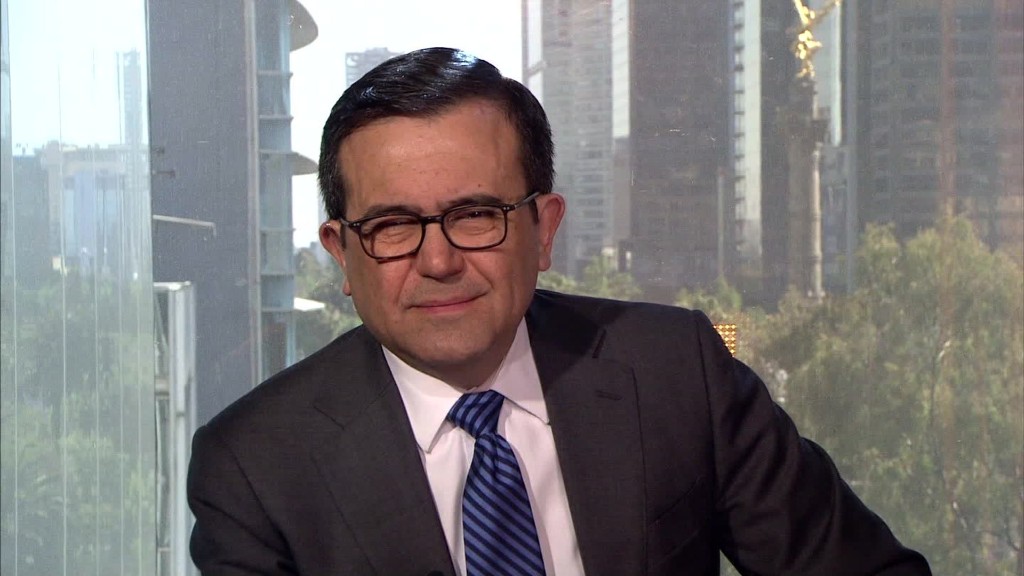
House Republicans are proposing a major reform called a border adjustment tax. President Trump was against it, but he's warming up to it. It could come up in his address to Congress on Tuesday night.
And if it passes, it'll be a big deal for American consumers. It's complicated, but stick with us. Here's what you need to know.
What is it?
A border adjustment tax would give tax breaks to American companies that ship products to other countries, and it would strip away tax breaks from American companies that import goods from other countries.
What is it supposed to accomplish?
As President Trump would say: Bring the jobs back.
A border adjustment tax is supposed to encourage companies to make goods in the United States. It's meant to remove the incentive for companies to move jobs overseas solely for tax reasons.
Initially, a border adjustment tax makes it cheaper to export goods and more expensive to import products from abroad.
Related: Trump vs. Trump on the global economy
Here's the catch
The U.S. dollar has to go up -- bigly.
The whole thing only works if the dollar rises roughly 20% in value, and quickly.
That's a big bet. A 1% move in the dollar on any day is a major swing.
The thinking is that a border adjustment tax would create such an incentive for companies to make things in America that it would drive up demand for American-made goods. Higher demand would push up the value of the dollar.
If the dollar rises 20%, then the benefits for companies -- whether they import or export -- basically go back to where they started. But the incentive to move jobs abroad for tax reasons is still gone.
Of course, if the dollar doesn't rise 20%, prices for consumers will go up, according to one analysis by the New York Federal Reserve. The National Retail Federation, a staunch opponent, predicts everyday items you buy will get a lot more expensive. More on that below.
Related: NY Federal Reserve economists criticize border adjustment tax
What do supporters say?
The dollar will rise 20% in value and companies will be encouraged to produce in the United States.
With a stronger dollar, American companies that import will have more buying power and Main Street Americans won't see prices go up.
For companies that export, it will be cheaper for them to assemble and manufacture goods.
What does Trump say?
He seems to be getting closer to supporting a border adjustment tax, after trashing it right before he took office.
On Jan. 16, he told The Wall Street Journal, "Anytime I hear border adjustment, I don't love it."
But last week he told Reuters, "It could lead to a lot more jobs in the United States."
Trump has not given the idea a full endorsement. He has floated the idea of a 20% tax, or tariff, on all goods coming in from Mexico. He's also threatened tariffs against China.
A border adjustment tax is considered a less threatening alternative.
Related: Mnuchin promises tax reform by August
What do the haters say?
Retailers are bugging out. Even the Federal Reserve's economists don't like it.
They say prices for clothes, TVs, cell phones and other everyday items would go up significantly. The National Retail Federation forecasts that prices would rise 15%, costing the average American family an extra $1,700 a year.
Many economists are skeptical about a border adjustment tax because they don't believe the dollar will rise 20%, or that it will rise fast enough.
The issue is that the dollar is influenced by many things. It's sort of like golf.
Let's say you have to make a hole-in-one on the 18th hole to win a championship. Sure, you have to hit the ball perfectly.
But the golf ball's destination also depends on the wind, the texture of the grass, the slope of the green ... you get the idea.
The dollar has its own influences, not just tax policy. It's hard to predict, let alone make, a hole-in-one on tax reform. For the dollar, its wind, grass and slope are things like Fed rate hikes, commodity prices and the strength of the U.S. economy.
For companies that ship abroad, there's concern that if the dollar rises 20% in value, their products would become too expensive for foreign buyers. In 2015, the U.S. manufacturing sector went into recession because of a sharp increase in the dollar.
It's also unclear whether the World Trade Organization, which includes the United States, would approve a border adjustment tax.
If the WTO rejects the idea but the United States goes ahead, other countries can sue the United States through the WTO.


